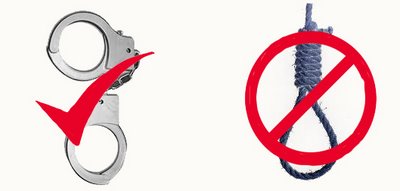When a state condones the killing of its citizens it is a no brainer that the citizens of that state will adopt the same behaviour for the resolution of their personal grievances. The USA re-introduced the death penalty in 1977 and as at 2002 the homicide rate per 100k people was 6.1 from a low of 4.7 in the 50’s via an all time high of 10.7 three years after the its re-introduction in 1980. Compare those figures north of the border in Canada where the death penalty was abolished in 1973 where the homicide rate has been steadily declining to an all time low in 2003 of 1.7 per 100K people.
The Philippines with a homicide rate running at 3 times that of the US will hopefully follow the Canadian trend but one suspects that the real deterrent will be detection and prosecution. And this is the arena in which a lot more work needs to be done. The host of unsolved murders of journalists and political activists must be addressed for the country's leaders to be taken seriously.


1.7 per 100K people?!?
ReplyDeleteooops. sorry, i accidentally posted an unfinished comment.
ReplyDeleteanyway...
that statistic's amazing! i wonder how we could achieve that here, in the land of road rage and ubusan ng lahi (clannicide?).
Oh boy, Henry. This is a can of worms. I'm against the death penalty, too. And improvement of detection and prosecution here? I really hope so.
ReplyDeleteYou hit it right on the bullseye, Henry. It is not the abolition of the death penalty that will bring the crime rate down in the Philippines. It is the country's system of detection and prosecution itself.
ReplyDelete